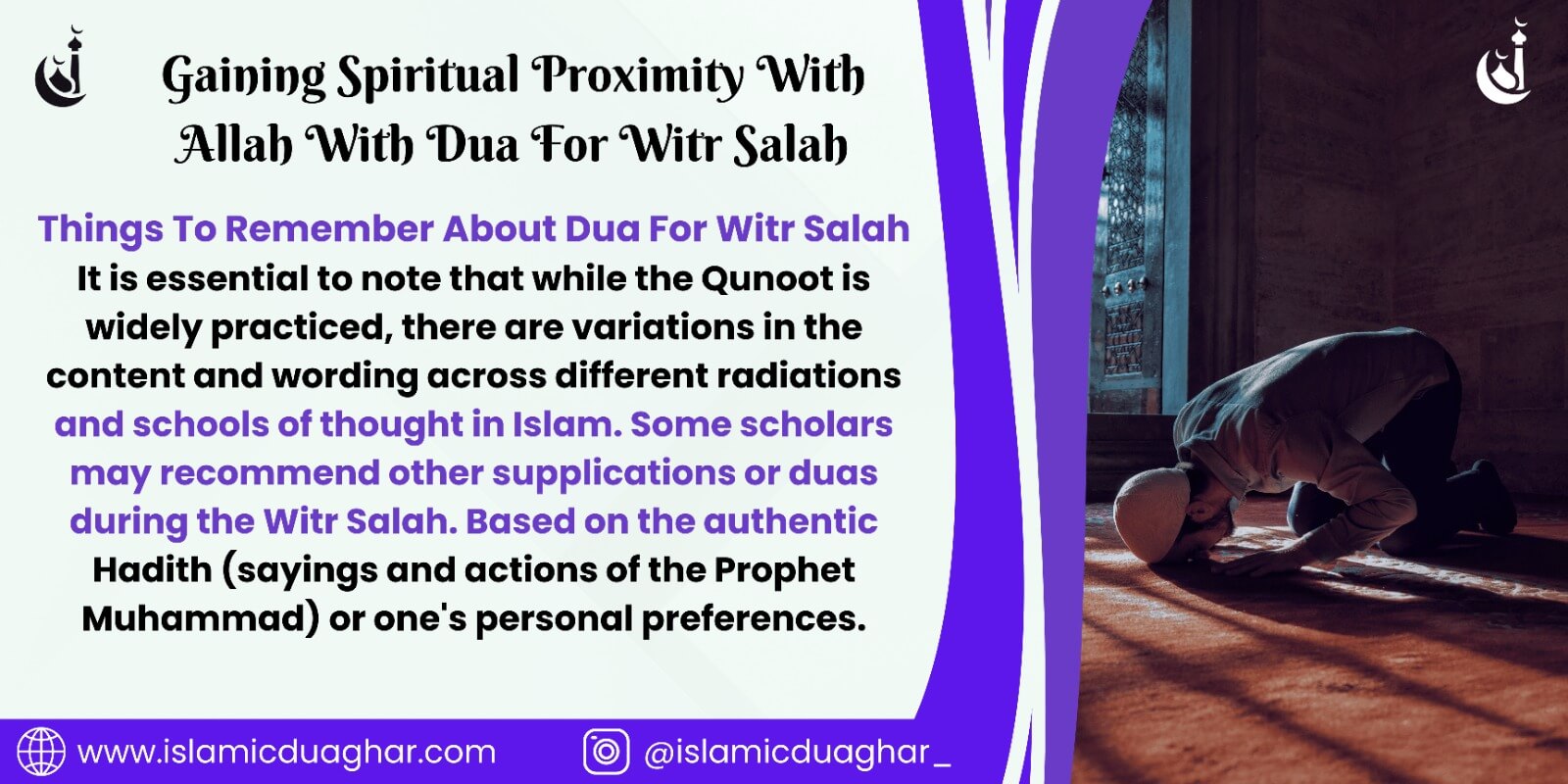The word “Salah” is an Arabic term for prayer, which has immense significance in Islamic culture. It is one of the five pillars of the faith. There are numerous types of prayers within the framework of Saalah. One of them is Witr Salah. The Witr Salah is an esteemed and unique form of prayer in Islamic culture. It is usually performed after the Isha or night and before the Fajr or dawn prayer. Its characteristic feature is its ID number of Raktas or units of prayers. The believers usually pray as one, three, five, seven, or nine Raktas, with an odd numeral being the preference. The believers regard dua for witr salah as highly recommended, and it holds immense significance at a spiritual level in the life of a Muslim.
Like all the other prayers in Islam, the Witr Salah begins with the niyyah, or intention, of performing the prayers entirely for the sake of Allah. The way of performing the Witr prayers is like the other sunnah, or obligatory prayers. Certain paranormal actions and reactions were Prophet Muhammad (peace be upon him) prescribed. However, one of the most notable features of the Witr Salah is the presence of the application or dua that the believers make during the performance of the Witr Salah.
The Facets of Dua For Witr Salah
The dua for witr salah varies. The believers can perform it in different ways. Some Muslims tend to recite particular verses from the Quran or particular supplications that the Prophet Muhammad (peace be upon him) had made. While others might opt for making personal supplications from one’s heart, regardless of the method that one chooses. Some of the dua in Witr Salah are seeking proximity to Allah, requesting His guidance, blessings, and forgiveness. Expressing one’s dependence and gratitude towards Him.
One of the most often recited duas during the Wtr Salah is known as the “Qunoot “. Qunoot is a prayer that is made during the Witr prayer. It is usually recited after the roku, or bowing, and before the sujood, or proration, in the final rakat. The Qunoot supplication can differ in wording and content. However, the essence of the Qunoot remains the same: seeking mercy, protection, guidance, and forgiveness for oneself and the entire Muslim community from Allah.
Things To Remember About Dua For Witr Salah
It is essential to note that while the Qunoot is widely practiced, there are variations in the content and wording across different radiations and schools of thought in Islam. Some scholars may recommend other supplications or duas during the Witr Salah. Based on the authentic Hadith (sayings and actions of the Prophet Muhammad) or one’s personal preferences.
Added to that, the beauty of dua for witr salah is in the heartfelt connection and sincerity with Allah. There are several recommended supplications and prescribed forms of dua. Muslims are motivated to express their personal degrees, needs, and aspirations to Allah while they are praying. It is a person-to-person interaction that fosters a more intense connection at a spiritual level and helps strengthen the bond between Allah and His worshippers.
Final Words
In conclusion, the Dua for Witr Salah holds immense significance in the practice of Islam. It is a moment of intimate communication between the believer and Allah. Where one can seek guidance, forgiveness, and blessings, as well as express gratitude and dependence on the Divine. While there are recommended supplications such as the Qunoot, Muslims are encouraged to make heartfelt duas during their Witr Salah, connecting with Allah on a personal and spiritual level. Through these supplications, believers find solace, strength, and guidance in their daily lives. Enriching their spiritual journey and drawing closer to the Divine presence.
If you want to avail yourself of more information regarding the different aspects of the culture, community, and traditions of Islam. Our website, Islamicduaghar, is the perfect destination for you. Our website has a plethora of such discussions where we offer you knowledge about the different duas, supplications, and ways to gain Allha’s mercy and protection. Additionally, you can reach out to Maulana Atif Khan if you need recommendations or advice on any instance of your life. So, with us, you gain better spatial proximity with Allah, and you learn different ways of gaining His guidance, mercy, and protection. Visit our website to know more!
Frequently Asked Questions
What is the significance of the dua in Witr Salah?
The dua in Witr Salah holds great importance as it is a moment of intimate communication between the worshiper and Allah. It allows Muslims to seek guidance, forgiveness, blessings, and protection, as well as express gratitude and dependence on Allah.
When is the dua performed during Witr Salah?
The dua is typically performed after the bowing (ruku) and before the prostration (sujood) in the final rakat of the Witr Salah. It is recited while standing after the completion of the recitation of the Quran.
Is there a specific dua prescribed for Witr Salah?
While there are recommended duas for Witr Salah, such as the Qunoot supplication, there isn’t a single prescribed dua. Muslims have the flexibility to choose from various supplications taught by the Prophet Muhammad (peace be upon him) or make personal duas from the heart.
Can I recite the dua for Witr Salah in my native language?
Yes, you can recite the dua for Witr Salah in your native language. While Arabic is the language of the Quran and the language traditionally used for Islamic prayers. Allah understands all languages, and sincerity in supplication is more important than the language used.
What if I don’t know any specific duas for Witr Salah?
If you don’t know any specific duas for Witr Salah. You can start by reciting any duas or supplications that you are familiar with and seeking guidance, forgiveness, and blessings from Allah. Over time, you can learn and incorporate specific Duas recommended for Witr Salah.

